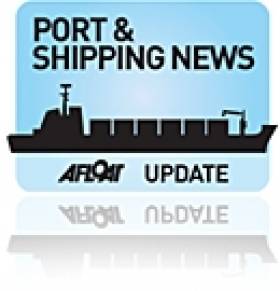Displaying items by tag: Belfast Harbour Company
Belfast Harbour Port Masterplan: 20-30 Year Period
#BelfastPort – In this 400th anniversary year of Belfast Harbour which was established by a Royal Charter, the port in 2013 has embarked on a Port Master Plan for a period over the next 20-30 Years.
The Masterplan sets out Belfast Harbour Company's (BHC) medium to long term development plans for consultation in order to inform stakeholders and assist local and regional planning authorities to prepare and revise their own plans.
BHC plays an essential role in the local economy of Belfast and regional economy of Northern Ireland. The Northern Ireland economy is largely dependent on seaborne trade and BHC handles 60% of this trade and 20% for the island of Ireland.
Belfast Harbour directly and indirectly supports approximately 31% of Northern Ireland's Gross Value Add (GVA) and 27% of employment. The Harbour Estate, extending to almost 2,000 acres, is home to over 650 businesses employing circa 17,000 people.
Forecasts for Belfast Harbour, indicate a potential growth in port tonnage of circa 68% from 17.6 million tonnes in the base year (2012) to 29.3 million tonnes in 2030. This represents a Compound Annual Growth Rate (CAGR) of 2.8%
The capacity analysis and resulting infrastructure and land strategy indicates that, to accommodate the projected tonnage of 29.3 million tonnes, an additional 60 acres of land must be created through reclamation.
The infrastructure and land strategy includes a significant increase in the intensification of use of the current facilities through the redevelopment of existing infrastructure.
For further details of the Belfast Harbour Port Masterplan, click here to download a PDF copy.
Major Wind-Energy Hub Planned for Belfast Port
Belfast Harbour could potentially become one of the leading energy renewable hubs in the UK, when DONG Energy, a leading Danish energy firm, signed a letter of intent yesterday for an agreement to progress on a number of offshore wind farm projects in the Irish Sea.
In addition as part of the project, Belfast Harbour are to invest £40m in the development of a new 450-m long quay. The facility will be adjoined by a 50-acre logistics space on the southern shoreline of the port's docklands estate on Belfast Lough. The construction phase will create 150 jobs and up to 300 full time positions when the facility is completed, where the wind turbines and their foundations will be pre-assembled.
At that stage the large wind farm components will then be loaded onto specialist wind farm installation /construction vessels as depicted on the image by clicking here and to read further information on the overall project.
Attending the announcement which was held in Belfast Harbour Office, were representatives from the Northern Ireland Executive, Peter Gedbjerg, Vice President and UK Country Manager of DONG Energy, and Len O'Hagan, Chairman of Belfast Harbour. The energy hub scheme represents one of the harbour's largest ever capital investment projects.

























































